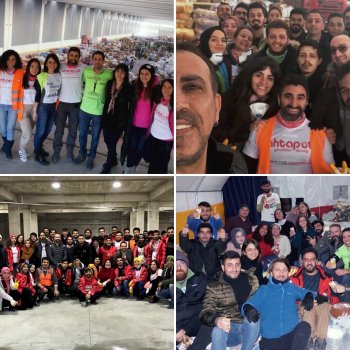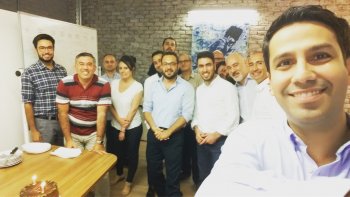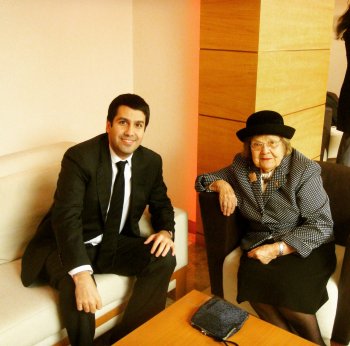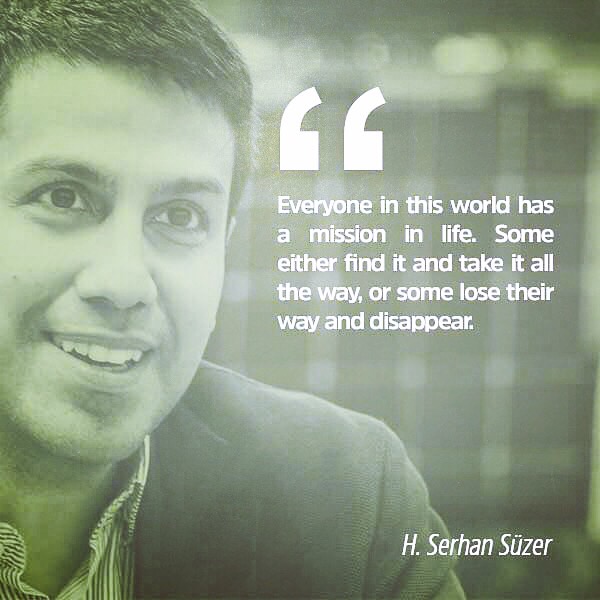Why has Turkey been unable to prevent violence against women?

When I last checked I saw it had been five months since my last blog post. So much has been happening I have been unable to find time to write. A recent tragedy, however, really shook me up and compelled me to write again.
I was not planning to write about violence against women but as a man I am deeply disturbed by any kind of violence against women, and by what has happened to Özgecan Aslan and other girls and women like her.
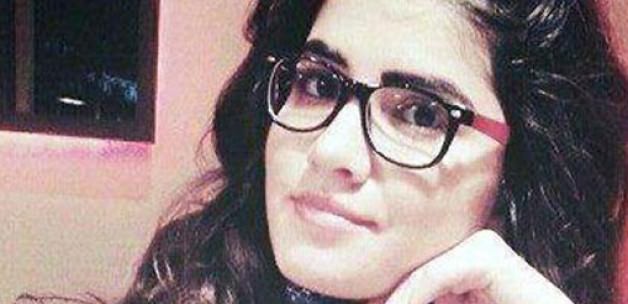
I think it best we listen to women on this subject. With good reason, women have been trying to raise their voices concerning this issue in social, print and visual media, as well as through other channels. For example, they have organized dozens of marches, at one of which they even went so far as to beat up a man. Well, if you plunge your jeep into a march protesting violence against women, open your window, insult the women there and then go so far as to get out of your vehicle and start pushing women around, the response you are likely to get from those women protesters is captured in this video: http://www.izlesene.com/video/ozgecan-aslan-eyleminde-dayak-yiyen-adam/8181426
Have all of these women’s efforts to make themselves heard resulted in progress? Regrettably, no. In fact, things have only got worse. Incidents of women being brutally murdered, beaten and harassed are still on the rise and still being covered by the media.
It seems to me that the punditry I have listened to and read neither accurately identify the problem nor present a satisfying set of solutions. It is for this reason that I have decided to analyze this issue and share my thoughts with you.
First of all, I believe that we have seen only the tip of the iceberg when it comes to violence against women. The deeper we delve, the more clearer the extent and scope of the problem becomes. I can say with confidence that violence in Turkey is not directed solely against women, but against men and homosexuals as well.
Children, teenagers, the middle-aged and the elderly are also subjected to violence. Family members are its victims, as are the employees of office plazas, villagers and townspeople. The public sector, private sector and even nongovernmental organizations are plagued by violence. There is violence at home, at work and on the road. In short, violence can erupt anywhere, at any time, under any circumstances. It might be verbal, written or physical, but violence is a constant threat.
The question I would like to pose is this: Here, in this wonderful country of us, how have we been reduced to this? How have we become a problematic and disturbed society riven by hatred, whose members do not hesitate to resort to violence? Are we all going mad? Is it possible for us to become a prosperous and peaceful society whose members treat each other with love and respect?
In order to answer these questions we need to analyze the root of the problem. Below I present solutions to this tangle of underlying problems.
1. Justice
It grieves me to say that the main reason for the steady increase of violent incidents in our country is the failure of the judicial system to function properly. The judicial system has numerous shortcomings that can be briefly summarized as follows:
a. The judicial system is not independent: Politicians and powerful individuals have undue influence. Unfortunately, judges, prosecutors and everyone else who is a part of the judicial system takes sides. Judges’ rulings can be biased. There are very few judges and prosecutors who base their decisions solely on an objective weighing of the evidence. Instead, partiality can result from political pressure or other factors, take the form of a “favor,” or be influenced by the identification of the judge with one of the parties. For example, some male judges not only take extenuating circumstances into account when rendering a verdict in a rape case but will even go so far as to find the victim guilty. Judges, prosecutors and everyone else in the judicial system are supposed to be objective, no matter what. That principle applies even if a judge is presiding over the trial of a close relative. In cases where judges feel they cannot be objective, they should recuse themselves.
b. Laws are ineffectual: Many of the laws in Turkey are ineffectual. I think the penal code needs to be completely revamped. I am not going to argue for or against capital punishment here, but I do believe that our current laws fail to act as a sufficient deterrent. If rape and murder were punishable by death or life in prison without parole, would that minibus driver have had second thoughts before he did what he did to Özgecan?
I will cite a different murder case –the full article is at this link: http://www.hurriyet.com.tr/gundem/28370632.asp. – to illustrate this point. In Antalya, 40-year-old Lokman Barış Çelik shot his 20-year-old girlfriend Deniz Aktaş in the head, heart and foot, killing her. He later testified that after murdering his girlfriend he considered suicide, but that his daughter P.S. talked him out of it when he called her to say farewell. The daughter persuaded him by pointing out he could simply do his time and then be released. He then called Deniz Aktaş’s mother, Figen Yetişkin, and told her that he had killed her daughter. Yes, that’s what the murderer’s daughter told him: “Do your time, and you’ll be freed.” That is the crux of the problem. Unless the murderer had completely lost his mind, you can be certain that the prospect of an extended period in prison would have caused him to think twice about killing his girlfriend. Unfortunately, in Turkey, there are many who have the attitude that one simply does their time for their crime, and that the victim’s family has to deal with their own loss.
I believe crimes such as rape and manslaughter should carry a heavy punishment, and everyone should know that there will be no exceptions.
c. Inadequacies in the judicial system: There are serious issues in terms of both sheer numbers and qualifications. Many judges and prosecutors are buried by a backlog of cases. It is considered normal in Turkey for court action to take five or six years, but it does not seem at all normal to me. In a country with a smoothly functioning judicial system cases should be resolved within a year at the most. When cases are dropped for exceeding the statute of limitations – whether intentionally or not – people are right to protest. For that reason we need both to increase the number of judges, and to ensure that the judges who do take their place in the judicial system are well-versed in the law, effective and unbiased, and guided solely by the rights and principles enshrined in law.
There is so much I could say about the judicial system in Turkey. For now, I will suffice with the observation that were Turkey to have an effective judicial system there would be a considerable decrease in violence against women, as well as all other forms of violence.
2. Education
There is also a lot to be said about education, which I elaborate on here, along with some suggested solutions.
a. Training of the educators: First, let’s look at those who educate children and teenagers. They can be divided into two groups:
- Parental training: We need to start with parental training. Before having children, future mothers and fathers should receive training in “raising children,” and once they have children they should have access to psychological consultations. There are a limited number of people in Turkey who understand how children should be educated. The majority of parents with an education do not know how to raise children, let alone parents without an education. What I have observed is that many parents think of themselves first and are not aware of what educating their children involves. Possession of a university degree does not mean a parent understands child psychology or is equipped to prepare their children for the future either. And then there are the families in both rural areas and major cities who do not consider the implications of having ever more children. There are even families who, far from worrying about how to secure an education for their children, would actually prefer that their children not go to school. They are either simply unaware of the importance of an education or they lack the resources to pay for it.
I would like to share with you what the mother of Özgecan’s killer reportedly said:
“Everyone is born an angel, not a thief or a murderer. My child had health problems. He grew up with his father, and that’s why he is this way. But he’s a human being, and my son has no right to take the life of another human being. I was unable to protect my child. His father had a violent streak. We have been separated for years. I didn’t want my children to grow up living with him. I suffered a lot of violence at the hands of my husband but I was unable to tell my mother and father. His father would beat me with a belt and sharp objects but I couldn’t tell anyone.”
Further details can be found at this link. http://www.aksam.com.tr/guncel/katil-suphi-altindokenin-annesi-tek-suclu-babasi/haber-382537
Can we really expect a child who grew up in a family environment like that to turn out normal? Unfortunately, even a child of sound character might grow up to be a psychotic killer after experiencing and witnessing that kind of domestic violence.
I think one of the important lessons mothers (and fathers, of course) can teach their sons is respect for women. It should be repeatedly emphasized and embedded in the consciousness of children that woman are our mothers, sisters and wives, and must always be respected.
- Teacher training: Turkey has a teacher problem. Similar to the judicial system, there are not enough teachers and the existing ones require further improvement in many areas. There are even a number of instructors with a propensity for violence. How successful can a teacher who beats his students be? Is anyone surprised to learn that there are such teachers? If so, follow the link to a recent article entitled, “This time, teachers burst into school!”:http://www.milliyet.com.tr/okulu-basan-bu-kez-ogretmenler–gundem-2027712/
- Education of children and youth: Our educational institutions, from primary and middle school up through high school and university, are unfortunately failing to prepare our children for real life and to instill in them contemporary, progressive and universal values, as well as honesty, and mutual respect and affection. Instead, we have a system that relies on memorization, learning by rote and standardized testing. In our schools we should be prioritizing teaching our children to be honorable and honest individuals as much as we emphasize book learning. The violence of the future has its roots in the mindset of students today, a culture in which hard workers are labelled “nerds,” honesty is equated with gullibility, and acts of bullying and violence are considered virtues. Right and wrong seem to have become conflated at our schools. We need to review our educational system, top to bottom. Hundreds of violent incidents take place at our schools every day, only some of which receive media coverage. These incidents can involve students, teachers, school administrators, parents and school employees; that is, everyone connected to our schools. Here is an example from last week of one such incident: http://www.hurriyet.com.tr/gundem/28479638.asp
3. Economic problems and unemployment: Economic hardship and joblessness are a major contributor to social trauma. Societies with high employment and high productivity tend to have lower crime rates, because their members tend to focus on their work. An employed person stays out of trouble. It really is that simple.
Here in Turkey, it is obvious that the economy is not doing well. There has been a significant rise in unemployment even as the business world complains that it cannot recruit qualified workers. This gap should be closed through vocational training programs. There are various methods to reduce unemployment. I won’t go into the details here, but on the subject of giving back to society we set up the Food Banking and Basic Necessities Association and Food Market, of which I am president, and realized our first project in Maltepe. For detailed information, follow the link:
http://www.haberler.com/destek-market-ihtiyac-sahiplerine-yardim-edecek- 7009586-haberi/
4. Psychological trauma resulting from faulty infrastructure and the lack of a system: Many of us are crammed into large cities. Traffic, water and power cuts, and health problems (there’s a flu epidemic these days) can make people depressed and aggressive. Because we fail to plan in a methodical way, problems arising from faulty infrastructure are inevitable. Even people who are placid by nature can become aggressive. This naturally causes some people to lash out at friends and strangers alike. Here is just one example: http://www.hurriyet.com.tr/gundem/21261426.asp
We, as a society, are suffering psychological trauma. I think we need to reverse the inward migration to the major cities. In order for people to enjoy a higher standard of living and improved health they are going to have to start living in towns and villages. Additionally, instead of concentrating so many resources in cities like Istanbul, Ankara and Izmir, we should be establishing smaller cities of under a million inhabitants that offer a high quality of life and sound infrastructure (such as mass transit and parking availability). In terms of land area, we live in a vast country. But for whatever reason, our population is highly concentrated in certain centers. The development and execution of a new national master plan would go a long way toward addressing the problems of economic development and unemployment. It would also offer an alternative to the reinforcement or demolition of old buildings in major cities damaged by earthquakes.
5. The cohort mentality: In this wonderful country of ours, a sense of unity has been elusive. Everyone picks a side. Then, everyone in that group provides uncritical and unconditional protection to the other members of that group. Of course this does not apply to everyone, but I would say it is true of the majority. Micro-nationalism is rampant in this country.
When I was doing my military service the first question I would be asked was, “Where are you from?” I didn’t particularly enjoy answering that question all the time, but I realized it was an attempt to place me and to determine how much I had in common with the person asking it. I tended to answer that question with a question: “Where are you from?” If the person said he was from an Eastern or Southeastern province I would mention that my father was from Gaziantep; if from the Black Sea region I would say that my mother was from Trabzon; if from a province in the West, I would say that I was born and bred in Istanbul. And so I would be able to form a bond with about 90% of the men in my company. I didn’t enjoy doing this but it seemed to be a good preemptive measure. To tell the truth, I am no fan of micro-nationalism. My door is always open to reasonable people, no matter where they are from. I want nothing to do with those with undesirable characters, even if they are my neighbors. This “cohort mentality” manifests itself in football fans, in political partisanship and in faith (religion, sects, etc.). Perhaps it is so strong and widespread because Thrace and Anatolia have been home to so many civilizations over time, so many different ethnic groups have lived in these lands and the Turks, in particular, were once a nomadic and clannish people. Even so, when a crime is committed, society and especially the judicial system should treat the perpetrator the same, regardless of his or her ideology, beliefs and background. Anything else is unacceptable. Due to the reflexive protection of those we consider to be “one of us,” nothing in this country works as it should. In a sense, this country suffers from a gang mentality, one that is dangerous enough to drag us into civil war. For this reason, the people not only of Turkey but across the world need to embrace universal values. An example of one of these universal values is that criminals are punished. It does not matter if the criminal is an immediate family member. Those who are honest, considerate, hardworking, public spirited and value their families should enjoy the success they deserve.
6. Media: If the Turkish media was more responsible they could contribute to a reduction in violent incidents. However, there are two major problems concerning the media.
- The media is not independent. The majority of the media outlets in Turkey are associated with a political party or movement, which slants all their coverage. For example, a newspaper that is close to the ruling party would never investigate problems in the educational system, and would in fact provide glowing coverage of the status quo. In reality, journalism should be a matter of simply presenting the facts to the public.
- There is a problem of ethics. In order to boost sales, most newspapers rely on screaming headlines and sensationalism. Some seek to boost revenues, some try to curry favor with the powers that be, and others are in hot pursuit of the latest “exclusive story,” even if it means fabricated and poorly researched news articles that have been known to themselves incite violence. It is the media that is mainly responsible for inciting sports-related violence, which is doubly tragic since sport ideally unites rather than divides. Tensions have been mounting to the point that when there is a football match between teams from the same area the fans of one of the teams have been banned from the stadium. There is a simple explanation for the media’s irresponsible behavior: They have to fill the sports pages every day, and if there is no real news then they simply make up news. In the run-up to major matches, the papers do not hesitate to report incendiary comments attributed to coaches and players, stoking passions and creating an environment in which violence is more likely to erupt. In fact, disputes and wars of words only boost their sales. Even so, it is time the media realized and acknowledged its role in inciting violence and leading the country to a dead end. It is time for the media to reconsider its portrayal of violence, warped relations between the sexes, intrigue and lies in its reporting, TV series and other programs, minimizing the negative effects it is having on society while still enjoying full freedom of the press.
In conclusion, much needs to be done in this country. We seem to be coming apart at the seams. We should all step up to address the various issues listed above, as well as others. As someone who personally does not think it is advisable to wait for the state or the government to handle everything, I am doing what I can as the founding president of my association to help the needy and disadvantaged, to provide vocational training and to contribute to development programs. You can find detailed information at our website:
We all have a duty to act. In our careers, as Turkish citizens and, perhaps most importantly, as parents, there is so much we can each do.
On a lighter note, I would like to share a photograph that perfectly sums up the relationship many men have with their mothers and wives. In this photo I took on the Bosphorus Bridge, the groom has written on the back of the wedding car: “My mother’s first and last daughter-in-law.” I wish him a happy marriage and congratulate him on the sentiment expressed on his car.
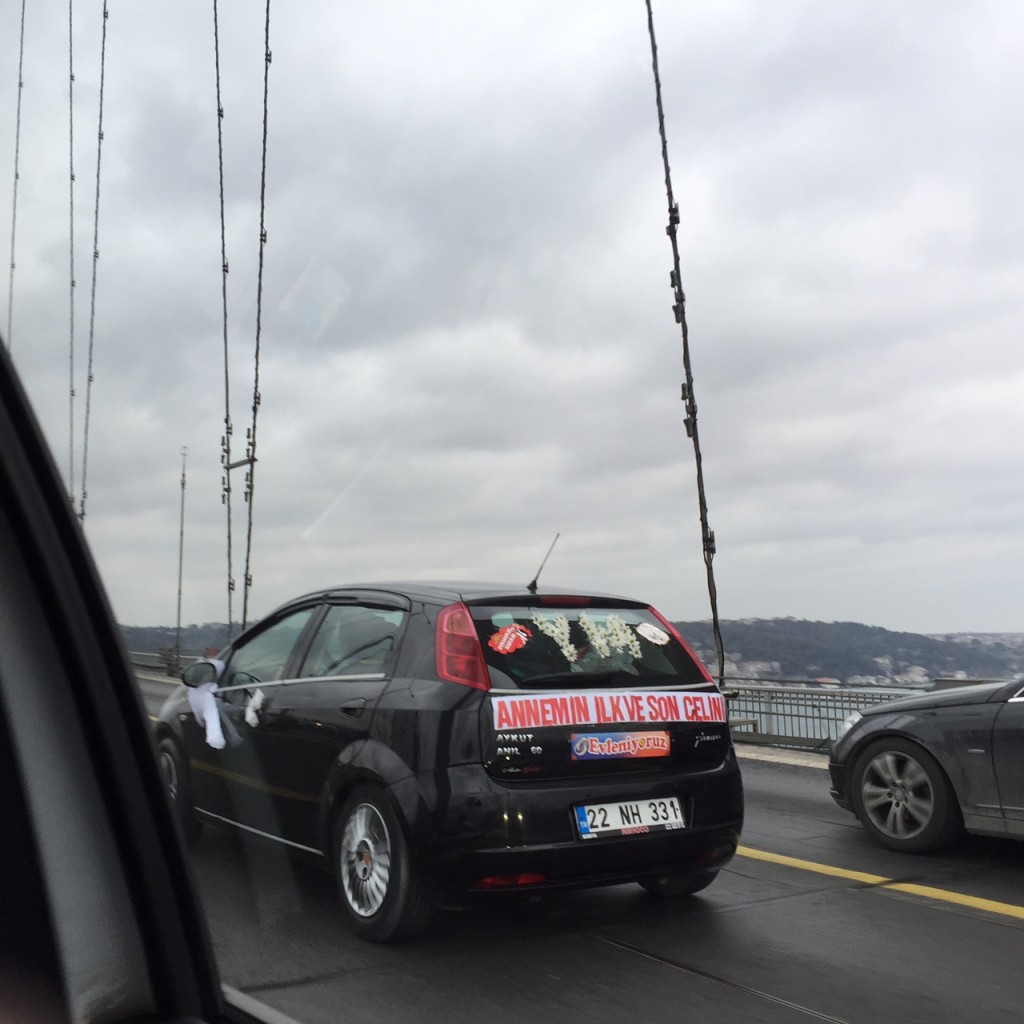
We must never forget that men and women need and complete each other. We must all play our part in preventing violence in our society. This blog post reflects my ideas and vision. I hope to see the day in Turkey when my generation applies these solutions…
Tag: yaşam

